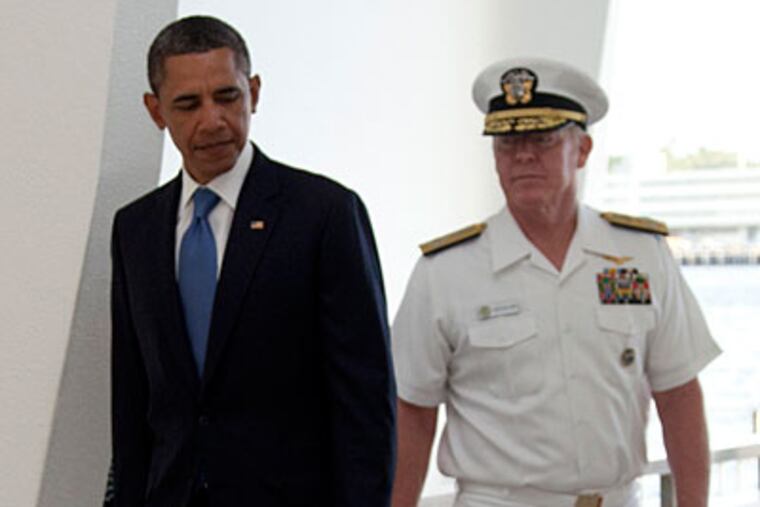Obama angling for votes from vets
WASHINGTON - President Obama ended one war and is winding down another, bringing home tens of thousands of U.S. troops. Now he wants them to pay him back - with votes.

WASHINGTON - President Obama ended one war and is winding down another, bringing home tens of thousands of U.S. troops. Now he wants them to pay him back - with votes.
"You stood up for America. America needs to stand up for you," Obama recently told service members returning to Fort Bragg, N.C., from Iraq.
Expect to hear that pitch throughout the next year as Obama's campaign, mindful that large numbers of veterans and military families live in states crucial to his reelection chances, highlights his efforts to promote jobs and benefits for veterans returning from Iraq and Afghanistan. Republicans, meanwhile, are already countering his record, noting high unemployment among veterans.
The outreach to veterans is part of a larger effort by Obama to build inroads with voting blocs traditionally outside the Democratic umbrella while trying to reactivate the coalition of women, minorities, and young voters who helped propel him to the White House in 2008.
While Democrats have traditionally trailed Republicans on defense and national-security matters, Obama senses an opening with veterans because he has generally received high marks from voters for his handling of terrorism - especially after the U.S. raid in May that killed Osama bin Laden - and in managing the relationships between the United States and other countries.
Exit polls in 2008 showed that Obama drew about 44 percent of voters who said they served in the military, while 54 percent voted for Republican John McCain, a former Navy pilot who was a prisoner of war for more than five years during the Vietnam War. In 2004, George W. Bush, who sought reelection as the nation waged wars in Iraq and Afghanistan, won 57 percent of voters who said they served in the military, compared with 41 percent for Democrat John Kerry.
There are obvious political reasons for Obama's effort.
Several states that will be heavily contested next year have a significant military presence. Florida, home to a number of military installations, has more than 1.6 million veterans. Virginia and North Carolina, which Obama carried in 2008, both have about 800,000 veterans, and Colorado has more than 400,000.
This year, the playing field in the fight to woo veterans may end up being level if anyone other than Texas Gov. Rick Perry and Texas Rep. Ron Paul - the only two in the GOP field with military experience - wins the nomination. Obama had no military experience before becoming commander in chief.
As the nation winds down wars in Iraq and Afghanistan, Obama and wife, Michelle, have held numerous events at military bases and in communities heavily populated by veterans. Since entering the White House, the first lady has held about 50 events with military families in 14 states.
Obama also has talked up his work on a new GI Bill helping veterans and service members to attend college and on tax incentives for companies that hire veterans, a piece of his jobs bill that Congress passed in the fall. The Democratic National Committee featured the incentives in ads that aired in North Carolina, New Mexico, and Ohio.
Republicans challenge Obama's record on veterans' issues by pointing to high jobless rates among those returning from military service - more than 11 percent of veterans who have served since the Sept. 11, 2011, attacks are unemployed. Republican candidates also have raised concerns about defense spending and about Obama's move to withdraw troops from Iraq and Afghanistan.